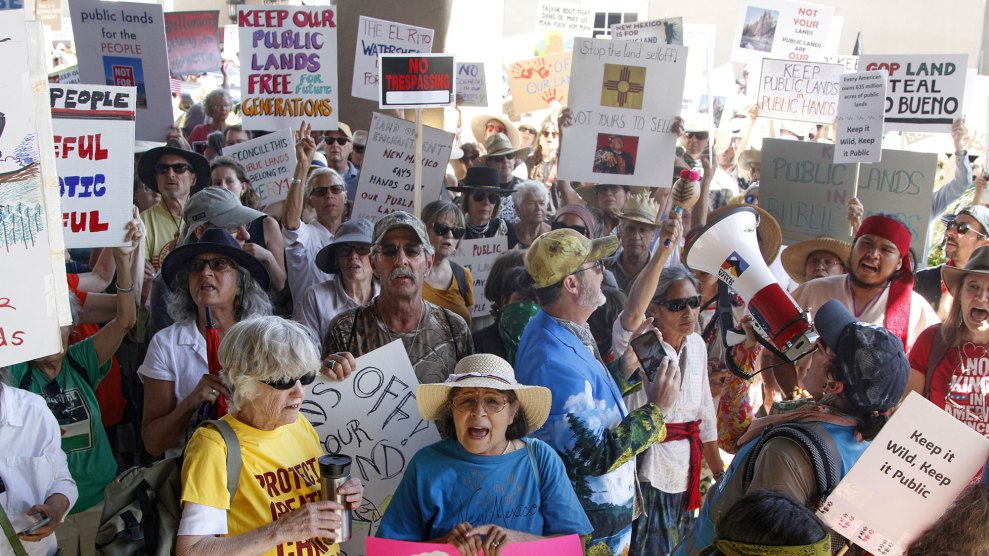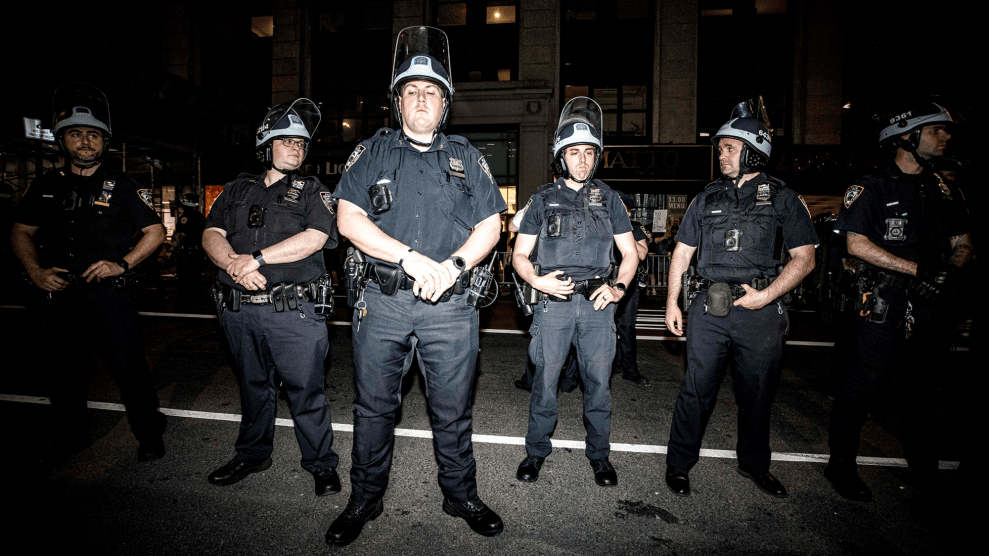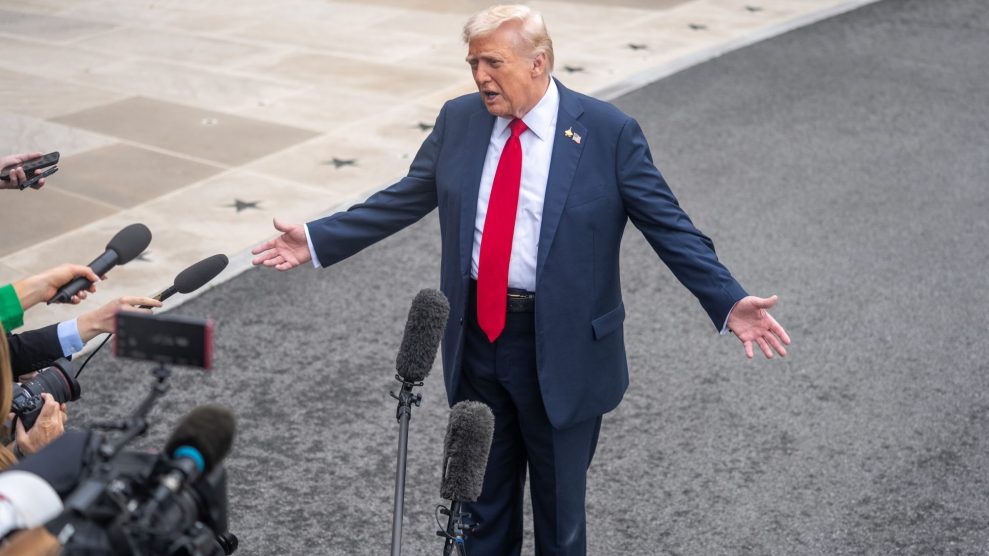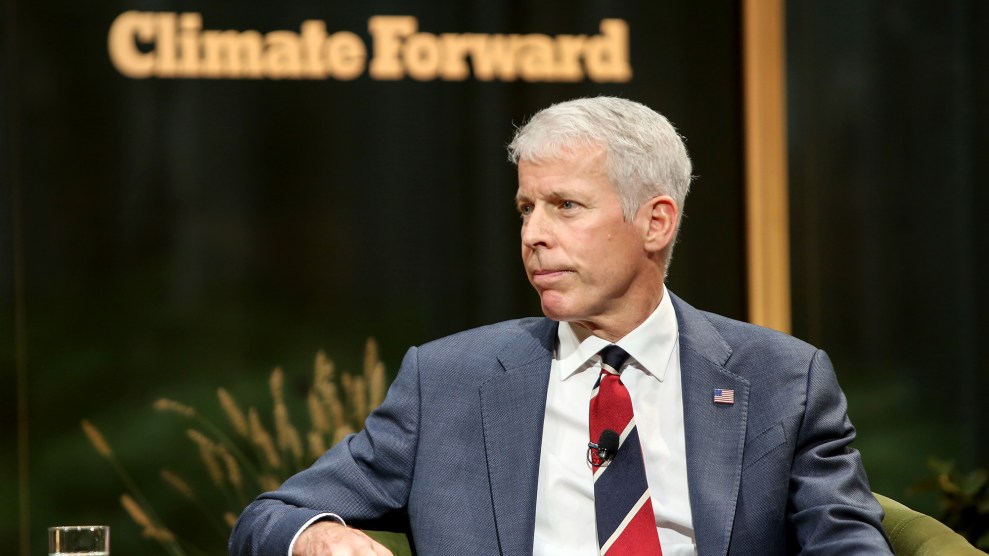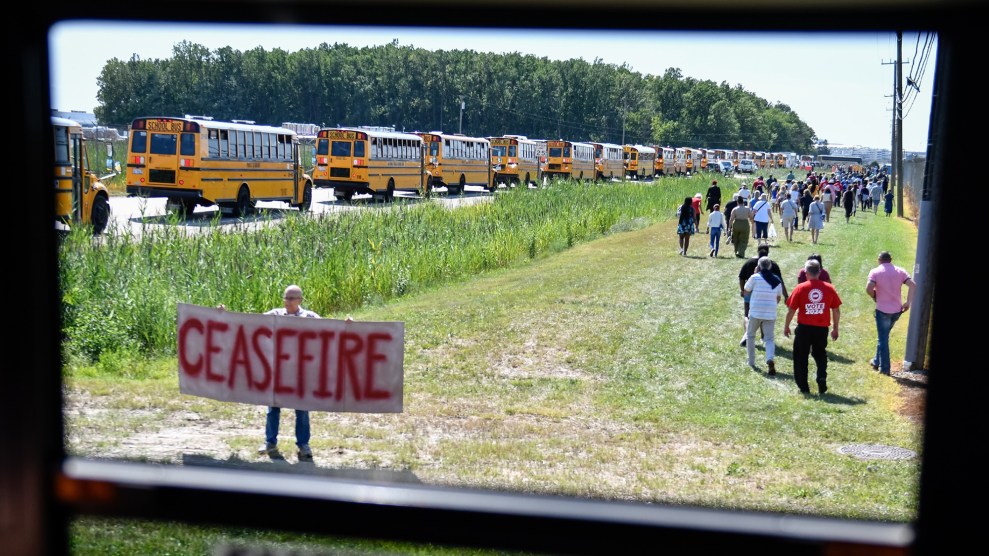
Rally-goers stream past a protestor holding a sign that calls for a ceasefire outside the Kamala Harris and Tim Walz presidential campaign event near Detroit.Adam J. Dewey/Anadolu/Getty
On Wednesday, Vice President Kamala Harris briefly met with Uncommitted movement leaders Layla Elabed and Abbas Alawieh before a public rally. It was the first time a group affiliated with the diverse and varied pro-Palestine movement had interacted face-to-face with Harris since her elevation to presumptive Democratic nominee.
The Uncommitted movement co-founders—who represent Michigan voters who chose not to pick Biden as a Democratic nominee because of his policies supporting Israel during its offensive on Gaza—were introduced to the vice president by one of her aides, they said.
In that short conversation, Elabed and Alawieh told Mother Jones, Harris expressed some empathy for Palestinians. “We were kind of holding onto each other as I was speaking, because I was so emotional,” Elabed said. But she, and the movement, were also clear with Harris: They wanted more than words and emotion. They want a formal, official meeting with Harris to talk policy.
“I told VP Harris through the tears that Michigan voters want to vote for her,” Elabed said, “but we need a policy change that is going to save lives.”
“We need Vice President Harris to embrace an affirmative message that stops the killing so that we can mobilize voters for whom Gaza is a top policy issue.”
An arms embargo has been the central request of the Uncommitted movement, who garnered 700,000 votes and will be sending 30 delegates to the Democratic National Convention. Elabed asked the vice president if she would formally meet with her and Alawieh to discuss an embargo. “She agreed, yes, we will meet,” Elabed recalled. And “she said ‘it’s horrific’” of the bombing of Gaza.
But, during the brief interaction, Harris did not say whether she would make any movement towards an arms embargo or when a meeting would happen. When contacted about the conversation, the Harris campaign would not clarify whether the Uncommitted movement was formally invited to the rally.
“We were invited to join the VP in welcoming her to Michigan, and that’s when both Layla and I each had our own one-on-one interactions with the Vice President and Tim Walz,” Alawieh said.
A spokesperson for the Harris campaign told Mother Jones: “Since October 7, the Vice President has prioritized engaging with Arab, Muslim, and Palestinian community members and others regarding the war in Gaza. In this brief engagement, she reaffirmed that her campaign will continue to engage with those communities. The Vice President is focused on securing the ceasefire and hostage deal currently on the table.”
Elabed had hoped for more. “Her empathy towards me, towards Palestinians, did feel genuine,” she said. “But that’s not enough, right? Palestinian children can’t live off of prayers and sorrows.”
At the announcement of Harris’ candidacy, the Uncommitted movement hoped that Harris would take less of a hardline approach to supplying Israel with weapons. But that policy change has not been forthcoming. And this week has become a flashpoint. At a rally in Michigan, shortly after the interaction with Uncommitted, Harris publicly rebuked protesters pushing for a ceasefire.
As Harris spoke, two activists interrupted her. “If you want Donald Trump to win,” she told the protesters to cheers, “then say that. Otherwise, I’m speaking.”
Elabed, who had spoken with the Vice President earlier that same day, was “disappointed.” (As Mother Jones reports today, the two protesters are not affiliated with the Uncommitted movement—even though the students share aims with Elabed and others pushing for a ceasefire and end to arms shipments to Israel.)
This interruption was more than predictable. For months, protesters have dogged President Joe Biden, interrupting campaign events and rallies with the same simple demand, which surveys say over 80 percent of likely Democratic voters want: a permanent ceasefire in Gaza.
President Biden has, in the past, introduced proposals for an “enduring ceasefire” to his allies in Israeli Prime Minister Benjamin Netanyahu’s government. But those proposals have not been successful. Biden has not called for an arms embargo, and—because Israel’s military depends on American weapons—many progressives have been frustrated, believing that the only way to end the carnage in Gaza would be to cut off the weapons. Since the start of the war, the US has enacted legislation providing at least 12.5 billion dollars worth of military aid to Israel.
As recently as June, Joe Biden responded to protesters on the campaign trail with more sympathy: “Look, they care. Innocent children have been lost. They make a point,” he said.
Harris’ response on Wednesday was quite different.
“These are protesters that are advocating for human rights,” Elabed said. “These are people in our community who are grieving and who for 10 months have watched people with names and faces like those in our community—have watched their family members’ homes and lives blown apart by American bombs.”
Campaign protests have in the past successfully shifted policy: protesters on former President Barack Obama’s campaign trail demanded protections for the children of undocumented immigrants.
The morning after Wednesday’s rally, the Uncommitted movement sent out a press release explaining their experience speaking with Harris, and requesting a formal meeting to discuss an arms embargo. Less than one hour after that email was sent, Harris’ national security advisor, Phil Gordon, tweeted that the vice president was absolutely not interested in stopping the flow of weapons.
“[Harris] has been clear…She does not support an arms embargo on Israel,” Gordon, who had previously written against America’s backing of Israel’s bombardment of Lebanon, stated. “She will continue to work to protect civilians in Gaza and to uphold international humanitarian law.”
Upholding international humanitarian law, as the International Court of Justice declared in July, could mean refraining from arms shipments to Israel. As such, it is not immediately clear what work Harris is “continuing” to do toward upholding that law and protecting civilians. The same day that Gordon reaffirmed Harris’ evident disinterest in an arms embargo, Israel bombed schools in Gaza City, according to on-the-ground reports.
“We know she doesn’t support an arms embargo,” Uncommitted co-founder Alawieh said in response to Gordon’s statement. “That’s why we need an update to this policy.”
Thousands of Michigan Democrats voted “uncommitted” in the primary—and if Harris doesn’t change course, the Uncommitted representatives said, she risks losing a crucial swing state.
“We know that Donald Trump’s policies would be destructive,” Alawieh said. “That’s precisely why we need Vice President Harris to embrace an affirmative message that stops the killing so that we can mobilize voters for whom Gaza is a top policy issue.”








